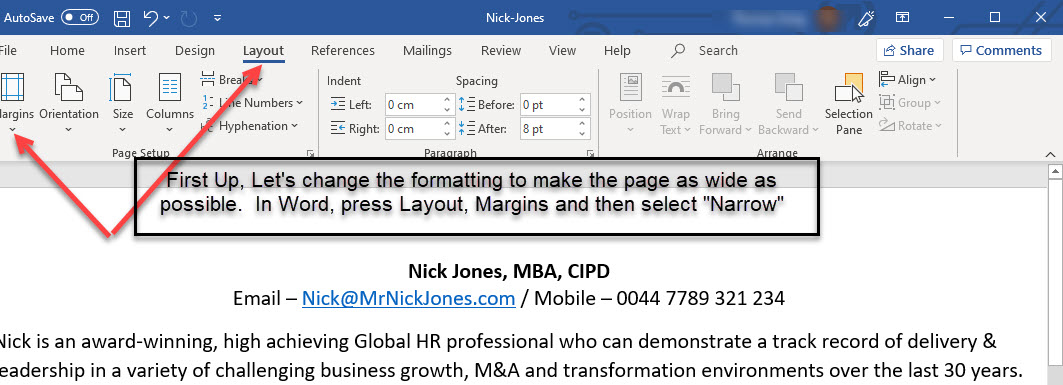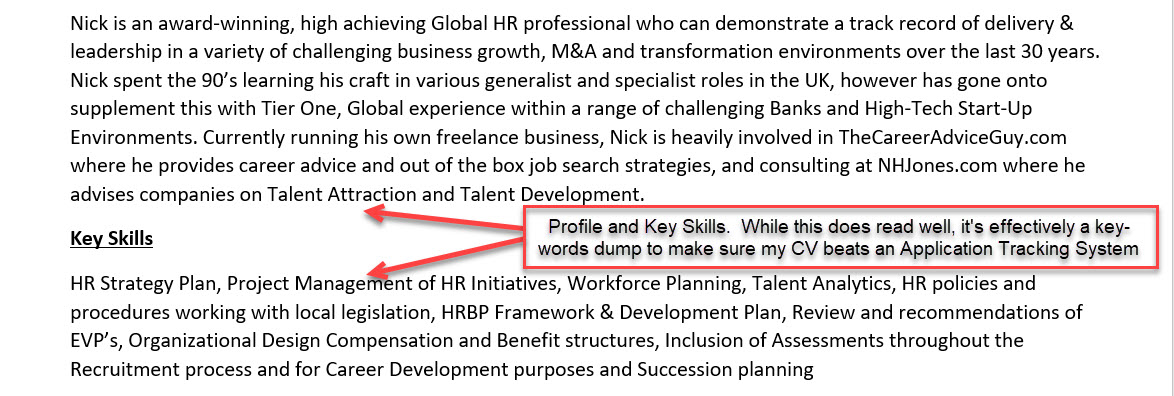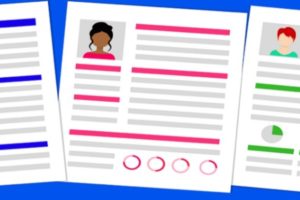What do you think of my CV? This is the number one question that any recruiter or career adviser is asked on a daily basis. The honest answer, if you follow a few basic principles, writing your CV, so it attracts an employer is not very difficult.
You do however need to be aware of a few black holes and tailor it the specific company or opportunity that you're applying to.
Ten Years Ago
Ten years ago, if you applied for a job, it's very likely that your CV would have been at the very least looked at by the hiring manager or recruiter. Today this is not the case. The first point of contact is likely to be the company’s applicant tracking system which will read your profile and attach a value of relevance to it. If your CV passes the relevance test, it's likely to be read, if not it drops into the CV black whole.
If your job search is not going well, generally candidates assume it's their CV. This is partly true, but it's probably not the information that you have your CV, it's what's not on your CV that should be that is the problem. This missing information will help you pass the relevance score. Over the last few years have shown that 70% of all candidate applications, never see human eyes.
In this section, we're going to focus on writing a CV that will pass the applicant tracking system relevance test, while at the same time pass the hiring manage review test.
CV Vs. Resume
The Perfect CV or Resume
What's the Point of a CV?
Before I begin to show you how to write a CV, let's start with a fundamental question. What's the whole point of writing a CV? Why do candidates spend hours changing single words, trying to make their CV perfect?
Ten years ago, I could easily tell you the point of writing your CV. Today it's a little more unclear. Even if you write a great CV and are perfect for the job, your CV might not even reach the hiring manager.
Technology, Social Media and the Internet are fantastic; however, it has made searching for a job accessible to everyone across the world. Job boards are global, and if you want to apply for a job in another sector or country, it's as simple as pressing a button.
From a company perspective, this means that companies are receiving thousands of CV's every week from candidates that are all vying for the same role. Writing a CV is no longer just about showcasing your knowledge, it's about making sure that your profile passes a companies applicant tracking system (ATS) and is read by the hiring manager.
Information That Must Be On Your CV
Before we start writing your CV, we need to think about what information needs to be on your profile to make sure that it passes both the applicant tracking system test and the hiring manager test. In short;
- Applicant Tracking Systems have been designed to help a company quickly and quickly sort through ten thousand CV's while choosing relevant candidates that have the right profile.
- Hiring Managers want to see candidates CV's that showcase their experience, knowledge and most importantly, their achievements.
The "ATS" Black Hole

Applicant Tracking Systems "ATS" work by a computer program reviewing your CV looking for specific keywords and phrases that have been designated by the hiring manager or recruiter. Very simply, if your CV contains all or some of these keywords, it's likely to be read. If not, it will automatically head to the bin. The hiring manager will not see it, and neither will the recruiter.
If you want your CV chosen, you need to make sure that you have every keyword possible that a recruiter or hiring manager will search for, on your CV. In principle this probably sounds like an impossible task, however, in reality, it's very straightforward. There's not an endless number of keywords that are relevant to each specific position. As long as we have the main keywords on our CV, it will be read.
Typically there are three types of keywords that a recruiter will search for:
- Company Specific Keywords
- Career Specific Keywords
- Job Specific Keywords
Job Advert Specific Keywords
Career-Specific Keywords
Company-Specific Keywords
What Does The Hiring Manager Want To See
If a hiring manager is recruiting, they're likely to be short of time. What does the hiring manager want to see on your CV? An ideal candidate who can do the job is not going to cause problems and most importantly will stay with them for the future.
Hiring managers want candidates that are perfect for the job, not candidates that could do the job in their sleep, or candidates that think they could potentially do the job if they had some training. Hiring managers candidates that will be challenged and therefore enjoy their working day. If the role is too easy or too complicated, it's more than likely a hiring manager will be looking for another candidate in six months after their first choice has left.
Job Relevancy is critical. You need to make sure you're applying to jobs that are a slight step up or a step sideways in terms of responsibilities otherwise no matter how good your CV is written, it's going to end up in the bin.
To present this information on your CV, we're going to split your CV into three sections, the CV Layout, Responsibilities, and Achievements. Below are the points that you need to consider in each section.
CV Layout
Responsibilities Vs. Achievements
CV Mistakes
Finally, we come to the common CV mistakes section where we have provided you with the most common candidate's mistakes. It's vital that you're aware of these mistakes so that you don't make the same mistakes when trying to write your CV.
- Write, re-write, check and re-check your CV - Ask a friend, to read and check your CV. Often the most natural mistakes are the most difficult to spot. You won't find them, but your colleague might do, and a recruiter or hiring manager will defiantly find them.
- You need to get my attention quickly - What do the first few lines of your CV say? My advice is to get as much useful information on the first few lines as possible. Next, to your name, put your qualifications. An MBA or other recognised qualifications do stand out.
- Your Objective - Never put your objective on your CV, firstly your space is limited, secondly if you are not interested in a Sales Role, why did you apply for it.
- Summary/Profile - It's unlikely that your summary will be read; however it's critical that you write a compelling overview of your career, showing your impressive achievements. It's also a great place to get a selection of keywords stacked into your CV.
- Keep It Short – Space is a premium on your CV so use it wisely. Remember at best I will be reading your CV for 30 seconds. How much can you learn in 30 seconds? If you're CV is ten pages, likely only the first couple will be read.
Responsibilities - For every position you have worked in, you need to make sure that you show your responsibilities in detail. What did you do? - Significant, impressive keywords such as "Head of Sales" - responsible for "selling the companies products," might sound great, but it does not tell me anything.
- Achievements - Make sure that you show your accomplishments. The percentage improvement, the profit made, the team grew by, trained, money saved are all great examples.
- Don’t Bend the Truth - Experienced Recruiters and Hiring managers have seen and heard of every game under the sun and are well adverse to something that smells wrong.
- Check Your Email and Telephone Number – How many times have I been sent a CV where the telephone number does not connect, or the email address bounces back. If I were given one dollar for every time this happened – well I would be a lot richer!!!
- Immaterial and Private Information– You don’t need to include hobbies, your sexual orientation, religion, relationship status or even your age.
How To Write Your CV

So far you should understand what an employer wants to see on your CV, How to separate it from the Crowd and most importantly how to pass the relevancy test on an application tracking portal. Now its time to put the above into practice and write your CV.
You should be able to write your CV yourself, but if you have money to burn or don't have the time to do it yourself you can hire a CV/Resume Writer who will write you a professional CV/Resume.
Hiring Managers and Recruiters will typically look at 100's of CV's every day to find the best candidates. For this reason, its vital that you follow the set structure as shown below to make sure the recruiter reads all the essential information that's on your CV.
Page Format

First thing to do is to change the margins of your page to make it as wide as possible. This way you can fit more information into one page. As show below, if you're using Microsoft's Word, Head to Layout at the top, followed by Margins on the left and choose, Narrow margins.
The difference is huge. Personally, I have about 1,000 words of content on my CV and it's the difference between a two page CV and a three page CV.
The Four Areas of Your Resume
There are typically Four distinct areas of your CV of which two will always be read, one is very useful for application tracking system portals and the final section, generally will be missed, but you need to make sure that you include it. The four parts of your CV are as follows;
- Section One – The Title
- Section Two – The Profile or Summary
- Section Three – Your Experience, Knowledge and Achievements
- Section Four – Qualifications and Other Information
The two sections that will always be read are Section One (The title) and Section Three (Your Experience). To write a great CV, you need to make sure that you use these two sections in the best possible way.
- Section Two (Your profile or summary) is an excellent place to put keywords that you've seen in the job description or the company website that will help you beat any applicant tracking systems
- Section Four generally will not be read, but it's useful and needed to be completed.
Section One – The Title

Let's start from the top and work our way down. The title will always be read as a recruiter will want to know the candidate's name and whether there is any contact information on the CV. Generally, when you open a magazine or a book, the first thing you naturally do is to look at the title and then work your way down from there. Your CV is no different.
Given the Top Section, your CV is guaranteed to be read, and this gives us a great place to put contact details and any critical information that could help your application. Remember, your CV needs to be a concise document, so while it's important that we do not cram everything together, space is at a premium.
Key Points
Section Two – Your Profile or Summary

Your summary is a crucial section of your CV. While it's unlikely to read, it's an excellent place for a selection of keywords to make sure that your CV beats the application tracking system portal and passes the relevancy score.
Your profile needs to be a short few lines about yourself providing your key skills and experience. My advice that unless you're at a managerial level, you should be writing "I believe myself to be" instead of "I am." This will make sure that you don't come across as someone who thinks they know everything. Confidence is great, but arrogance is something you don't want to have.
To best use this space on your CV, you need to make sure that you include both Company Specific Keywords, career-specific keywords, and job advert specific keywords to make sure your CV passes any ATS (Applicant Tracking Systems) that a company is using. If you need help writing your summary, there are 50 excellent CV summary examples here.
Section Three – Experience, Knowledge, and Achievements

It's crucial that you start this section as high up the first page as possible to get the most amount of content on the first page. Remember, recruiters and hiring managers will spend the nearly all their time looking at the first page, so make it count. If I spent 30 seconds reading your CV, 20 seconds would be spent on the first page, with the remainder on the rest.
It's critical that for each previous company that you have worked for, you include the name of the company, a description of the company, the dates you worked.
Previous Companies
Dates You've Worked
Job Positions
Responsibilities and Achievements
Section Four – Qualifications and Other Information

This Section should wrap up your CV and is a great place to put your education details, further education certificates and any additional keywords that are not in your CV but might be either on the Job Advert Description or Company Description.
- Education – Keep this brief and straightforward. Mention where you studied, the course title and the grade if you received a good mark. As discussed at the top of this post, any significant qualifications should go next to your name, but where you studied, and your previous education should go here.
- Addition Skills – This is an excellent section for I.T. systems, Language skills or any other relevant information such as, "your ability to relocate to another country."
- Hobbies – Keep your Hobbies Off your Resume.
Nick Jones
Latest posts by Nick Jones (see all)
- What Job Should I Do? It Depends on Whether You’re An Introvert Or An Extrovert - November 17, 2021
- Ten Ways to Unplug and Recharge During The Holiday Season - November 3, 2021
- 10 Jobs for Teenagers to Earn Extra Money - October 13, 2021











I have read a lot of post on online and on books but I have never got such an informative way of writing a CV, thank you very much for such an article of writing a CV.
Thanks for your post. The information given on your post makes the difference and spells success.